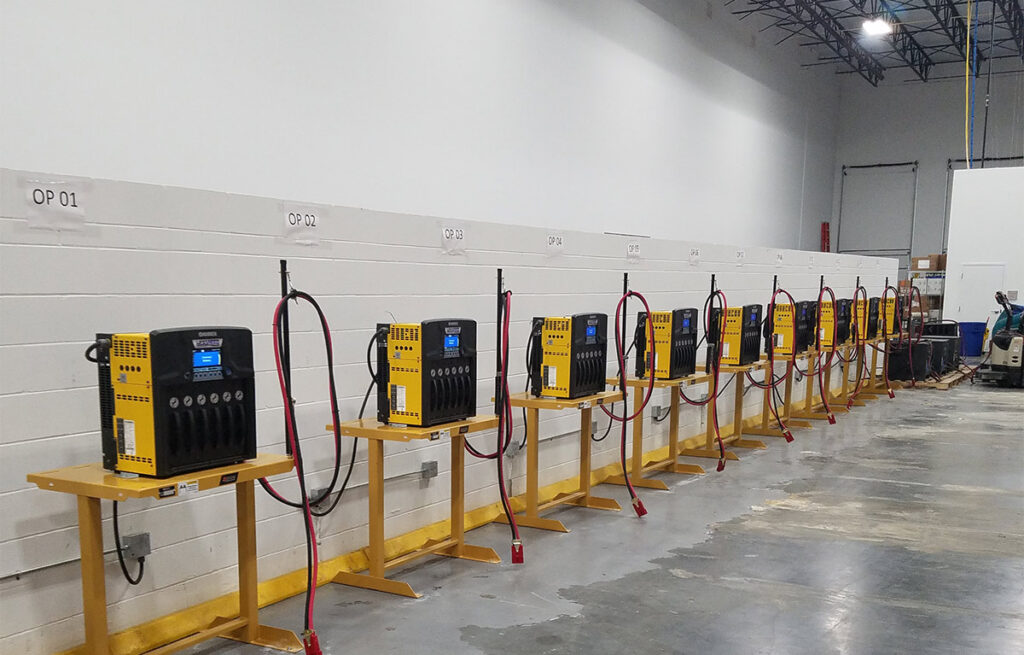In warehouses, distribution centres, and manufacturing plants, forklifts are the unsung heroes that keep operations running smoothly. These versatile machines efficiently transport heavy loads, making them indispensable in various industries. However, their productivity hinges on a critical component often overlooked: the forklift batteries and battery chargers. This guide discusses the intricacies of these essential power sources, offering insights into purchasing the right forklift batteries and chargers to enhance productivity and efficiency in your operations.
Understanding Forklift Batteries and Chargers
Forklift batteries serve as the lifeblood of electric forklifts, providing the necessary power to propel the vehicle and operate its lifting mechanism. Unlike traditional automotive batteries, forklift batteries are deep-cycle batteries designed to deliver sustained power over extended periods. These batteries typically consist of lead-acid cells housed in durable containers, ensuring resilience in demanding industrial environments.
Accompanying forklift batteries are chargers specifically tailored to replenish their energy reserves efficiently. Forklift chargers come in various configurations, from simple plug-in models to sophisticated systems equipped with advanced charging algorithms. The primary goal of these chargers is to restore the battery’s charge without compromising its longevity or performance.
Factors to Consider When Purchasing Forklift Batteries
Choosing the right forklift battery requires careful consideration of several factors:
Voltage and Capacity: Ensure compatibility between the battery’s voltage rating and the forklift’s requirements. Also, consider the battery’s capacity to meet the operational demands of your facility.
Size and Weight: Select a battery size and weight that fits seamlessly into your forklift’s compartment while maintaining optimal balance and stability.
Durability and Longevity: Prioritize batteries constructed with robust materials capable of withstanding the rigours of daily use. Look for warranties and maintenance support to maximize the battery’s lifespan.
Charging Requirements: Assess the charging infrastructure available in your facility and choose batteries compatible with your existing chargers or invest in chargers suited to your battery selection.
Types of Forklift Batteries
Forklift batteries come in several variants, each offering unique characteristics suited to different applications:
Lead-Acid Batteries: The most common type of forklift battery, lead-acid batteries provide reliable power and are relatively cost-effective. They are available in both traditional flooded and maintenance-free sealed designs.
Lithium-Ion Batteries: Emerging as a popular alternative to lead-acid batteries, lithium-ion batteries offer several advantages, including faster charging times, longer lifespan, and reduced maintenance requirements. However, they come with a higher initial cost.
Gel Batteries: Gel batteries utilize a gel electrolyte, offering enhanced safety and resistance to vibration and shock. They are ideal for applications where spillage is a concern.
Choosing the Right Charger for Your Forklift Battery
Selecting the appropriate charger is crucial for optimizing battery performance and longevity:
Charging Rate: Match the charger’s charging rate with the battery’s specifications to ensure efficient and safe charging without overloading the cells.
Charging Algorithm: Opt for chargers equipped with intelligent charging algorithms that adjust the charging process based on battery condition and temperature, maximizing charging efficiency while minimizing the risk of overcharging.
Compatibility and Connectivity: Ensure compatibility between the charger and battery connectors, voltage ratings, and charging protocols. Consider features such as data logging and remote monitoring for enhanced control and visibility.
Maintenance Tips for Forklift Batteries and Chargers
Proper maintenance is essential for prolonging the lifespan and performance of forklift batteries and chargers:
Regular Inspections: Conduct routine inspections of batteries and chargers for signs of damage, corrosion, or malfunction. Address any issues promptly to prevent downtime and costly repairs.
Proper Charging Practices: Follow recommended charging procedures, including avoiding rapid charging or overcharging, to preserve battery health and prevent premature degradation.
Cleaning and Ventilation: Keep battery compartments clean and well-ventilated to prevent overheating and ensure optimal airflow around the batteries during charging.
Cost Considerations and Return on Investment
While the initial investment in high-quality forklift batteries and chargers may seem significant, the long-term benefits outweigh the costs:
Operational Efficiency: Reliable batteries and chargers minimize downtime, allowing for continuous operation and maximizing productivity.
Longevity and Performance: Investing in durable batteries and efficient chargers translates to extended lifespan and consistent performance, reducing replacement and maintenance expenses over time.
Energy Savings: Advanced charging technologies and energy-efficient batteries can lead to substantial savings on electricity costs over the lifespan of the equipment.
Environmental Considerations in Battery Selection
Environmental sustainability is an increasingly important consideration in forklift battery selection:
Recycling and Disposal: Lead-acid batteries are recyclable, with established recycling infrastructure in place. However, lithium-ion batteries require specialized recycling processes, posing challenges for disposal and environmental impact.
Energy Efficiency: Lithium-ion batteries offer higher energy efficiency and reduced greenhouse gas emissions compared to lead-acid batteries, making them a more environmentally friendly option in the long run.
Investing in the right forklift batteries and battery chargers is paramount for maximizing productivity, efficiency, and sustainability in industrial operations. By understanding the key factors influencing battery and charger selection, implementing proper maintenance practices, and considering long-term cost and environmental implications, businesses can elevate their forklift operations to new heights of performance and profitability. Choose wisely, and reap the rewards of optimized power management in your facility.


